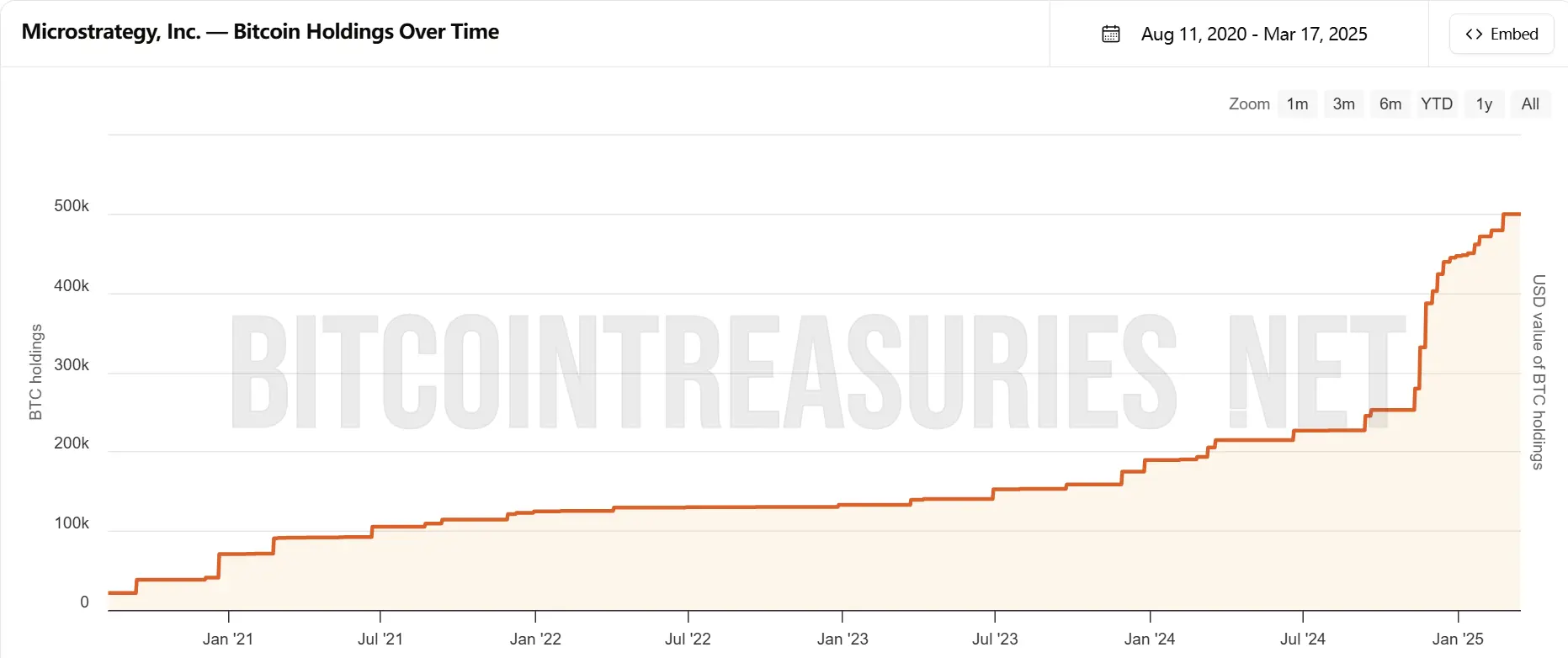Author: Scof, ChainCatcher

Recently, Strategy (formerly MicroStrategy) has officially filed documents with the U.S. Securities and Exchange Commission to issue up to $21 billion in 8% Series A perpetual preferred stock. This move has attracted market attention, as it not only involves large-scale fundraising, but may also have a profound impact on Strategy's BTC purchase strategy.
According to the official documents, these preferred shares have a par value of $100 per share, an annual interest rate of 8%, and dividends paid quarterly, which can be paid in cash, common stock, or a combination of the two. In addition, the preferred shares can be converted into common shares at a ratio of 10:1, i.e., every 10 preferred shares can be converted into 1 common share.
This preferred share issuance will adopt a "market issuance plan" model, which means the company can directly sell the preferred shares in the market, similar to the ATM issuance of common shares. This means that Strategy now has ATM financing channels for both common shares and preferred shares.
So how is this preferred share issuance different from the past? Will this innovative financing method bring new variables to the BTC market? This article will provide an in-depth analysis.
The Evolution of Strategy's Financing Methods
Before analyzing Strategy's latest financing method, let's briefly review its past ways of purchasing BTC.
In the early stage, as a software company, Strategy used its idle cash on the balance sheet to purchase BTC. This stage saw the initial three investments totaling 40,700 BTC.
As the company's investment in BTC increased, they began to use convertible preferred bonds (convertible bonds) for financing. Convertible bonds allow investors to convert the bonds into the company's stock under certain conditions, providing both downside protection (the principal and interest can be recovered at maturity) and potential upside gains from stock price appreciation. This method was used to purchase 119,481 BTC.
In addition to convertible bonds, Strategy has also issued secured preferred bonds, which are a type of collateralized debt instrument with lower risk than convertible bonds, but a more fixed return model. Using this model, the company purchased 13,005 BTC.
With the rise in MSTR's stock price, starting in 2021, the company has increasingly used at-the-market (ATM) stock issuance to raise funds. ATM is a widely used financing method in the U.S., which allows listed companies to directly issue new shares at the current market price in the public market to raise funds.
On February 20 this year, Strategy issued $2 billion in convertible preferred notes, a financing method that requires a more complex and time-consuming review process than before, so the market speculated that Strategy's pace of BTC purchases would slow down.
However, the $21 billion perpetual preferred stock submitted for review has once again raised market expectations that Strategy will return to a "buy, buy, buy" mode.

The amount of BTC held by Strategy. Source: bitcointreasuries.net
What's Different About the Preferred Shares?
Compared to past financing methods, the perpetual preferred shares being applied for by Strategy have obvious structural differences. In the past, the company mainly relied on debt financing and stock issuance to obtain funds, but this time's preferred share issuance has found a new balance between traditional equity financing and debt financing.
The main difference between preferred shares and common shares is that they do not rely entirely on the company's performance, nor do they have a fixed maturity date and principal repayment requirement. They are more like a financial instrument "in between the two", where the holders can receive fixed dividend income periodically, and under certain conditions, convert to common shares.
For Strategy, this means that it can continuously raise funds by issuing preferred shares without bearing the pressure of traditional debt financing to repay the principal at maturity. Compared to the convertible bonds and secured preferred bonds issued previously, this financing method provides greater flexibility and reduces short-term financial burdens.
Of course, this model is not without a cost. The annual interest rate of the preferred shares is set at 8%, which is obviously higher than the 0%-0.75% convertible bonds and 6.125% secured preferred bonds issued by Strategy in the past. The core question the market has about this is how the company will pay this significant dividend cost.
Analysts speculate that Strategy may use ATM issuance of common shares to make up for the funding gap, or even directly use the new shares to pay dividends. Although this model allows the company to raise funds quickly, it may also lead to the dilution of common shareholders' equity.
Is It a Good Time to Bet?
If Strategy's perpetual preferred shares are approved, it will undoubtedly bring new momentum to the BTC market.
Simply put, these preferred shares are essentially a more flexible and more sustainable way for the company to raise funds, and these funds will ultimately be used to buy BTC.
Compared to issuing bonds or directly selling shares in the past, perpetual preferred shares have no fixed maturity date, so the company can continue to use them to raise funds without the need to periodically repay the principal like debt financing. At the same time, since this preferred share issuance adopts a similar model to the issuance of common shares, Strategy can raise funds at any time based on market conditions, without the need to wait for approval or find specific investors like debt financing.
This means that the speed at which Strategy buys BTC in the future may accelerate, and it may be able to continue buying more steadily.
But is it appropriate to launch such an aggressive financing method in the current depressed market?
Goldman Sachs senior analyst James Carter said, "Strategy's $21 billion preferred share issuance plan shows Saylor's extreme optimism about BTC, but such high leverage operations may exacerbate volatility risks in the current market downturn."
Michael Evans, a fintech research analyst at Citigroup, believes that "against the backdrop of overall pressure on the cryptocurrency market, Strategy's choice shows its judgment of future trends. If the market rebounds, the returns could be amazing, but current attention needs to be paid to capital flows and changes in market sentiment."
Due to the complex financing structure of perpetual preferred shares, SEC approval may take several months. The ChainCatcher editorial team will continue to follow the progress.








